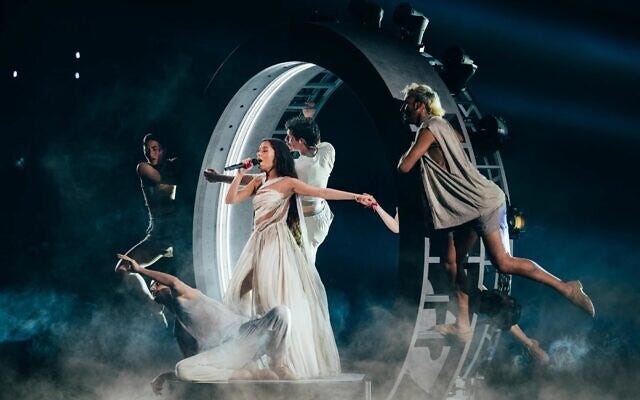Derision at Eurovision
Eden Golan's performance tonight will likely draw negative reactions from the crowd, but she has won over the hearts of many Israelis.
“The name Eden Golan sounds as though it was generated by an AI program trained on successful Israeli musical acts; Israel has been represented by singers named Eden at two previous Eurovision contests, while Golan is the surname of one of the country’s most successful male pop artists.”
-Ayelet Yagil, “As Eurovision 2024 Nears, Israel Is in the Hot Seat”. New Lines Magazine.
This is such a stellar observation and it leads nicely into this week’s post about Israel’s journey to Eurovision.
Major hats off to Ayelet Yagil for her recent article for New Lines Magazine. It is quite thorough and goes into Israel’s long history at Eurovision, including details of past victories and a lot of interesting background information. I certainly recommend a full read here.
A Rising Star
I remember listening to Eden Golan for the first time on Kochav Haba (Rising Star), a mix of the top singing competitions. This version of the show results in the winner representing Israel at the international song competition, Eurovision.
She sang Audra Day’s “Rise Up” and I was genuinely blown away. I’ve heard some talented singers on that show, some of whom have become famous, and I’ve watched the audition videos somewhat religiously. Eden brought something special that night. She belted out the smooth lyrics with precision. Something else that set her apart was her unaccented English. She sounded like a consummate professional and I was impressed.
Each new round brought another stunning performance. Eventually, she made it to the finals. The competition is partially voted on by viewers, so the decision was at least partially made by Israeli music fans. She thrilled the judges and there was no question that she was going to be our representative on the global stage.
I remember the excitement I felt waiting for her song to be released.
One day, I finally noticed it on YouTube. I pressed ‘play’ and it brought some genuine healing, as I listened on repeat. It wasn’t as angry as Charbu Darbur nor was it as deeply sad as a Yigal Oshri song. It blended melancholy and hope, while delivering pride and power. Music has always been a comfort for me, and “Hurricane” washed over me like a much calmer water-related event. My attachment to the song became even deeper upon learning that the original entry song was rejected.
The Song
The original entry for Israel’s song was titled, “October Rain”. This was deemed too political by Eurovision’s officials, and the choice was to either change the lyrics or face disqualification.
“At first, Kan refused to modify the song lyrics. But when the runner-up song, “Dance Forever,” was disqualified because it referred to the Oct. 7 Nova rave massacre, Israel’s President Isaac Herzog intervened. Stressing the importance of Eurovision to Israel’s international image, he asked Kan to change the lyrics to meet the EBU’s criteria. So the composers changed the title of the song from “October Rain” to “Hurricane” and altered the lyrics so that “writers of history” became “writer of my symphony” and “flowers” was replaced with “powers.” The EBU accepted the modified version with its carefully chosen lyrics and gave the green light to Israel’s participation.”
-Ayelet Yagil, “As Eurovision 2024 Nears, Israel Is in the Hot Seat”. New Lines Magazine.
In tonight’s performance in the Semi-Finals, Eden will sing a modified version of the original song, but it only really features a few minor changes. It still has the emotion and we still know what it’s talking about whether or not it directly references October 7th.
Security Concerns
Only yesterday did I learn that President Isaac “Bougie” Herzog encouraged the team to still go and participate after the song was originally rejected1. There was a chance that we would pass on the opportunity as a boycott of a desired boycott, but then Mr. President expressed the importance of proudly representing our country on the world stage. We needed to be there now more than ever.

Eden’s arrival there brought major security considerations. Not only did the Shin Bet fly to Malmo to protect Eden from potential danger, but the Chief of the Shin Bet, Ronen Bar, went as well to coordinate a security detail. Eden was ordered to stay in her hotel room, as protests were staged in the area. Can you imagine a singer not being forced to stay in her hotel room because of throngs of fans who want to take selfies and get autographs, but rather because her own safety is at risk? Not by the threat of a stalker or a few drunk fans, but an intimidating crowd of people who wish her and her country the absolute worst.
This seems like a singular event that an Israeli singer would face so much derision (that’s from the title of the post!) at Eurovision, but it’s nothing new. In fact, there was a great deal of security at Eurovision 1974, which was the year after the Yom Kippur War2. It’s curious that an entirely defensive war would draw so much negative attention, but this is a cultural Substack and not a political one.
Something to consider while watching or thinking about Eurovision is what Ayelet Yagil adds to her masterful piece (linked at the top): “Since 1973, Israel has made the finals on 38 of the 45 occasions it has competed in Eurovision…Most important for Israel, Eurovision has become a showcase for how it wants to be seen by the world — as a diverse, equitable, liberal and democratic society that Europeans will find relatable.”
It seems a tad ironic that those are the exact qualities, or the lack of them, that Israel is currently being chastised for. As many Israelis wish to fit in with the world and be seen as normal, this is another example of going it alone and charting our own course.
Raise Our Voice
There is a certain power in music and Eden will unleash that power tonight. In her own words:
"I feel these days it's not just a music competition. I come to make our voices heard all over the world at an important time. To show that we are strong but broken, that we've gone through something that no country and no people should go through, and to explain that no one can understand what we've been through unless they were here and experienced it up close. It's very important that they see Israel here3.
Eden has shown great maturity throughout this process and handled interviews quite well. She is only 20 years old, but she carries herself as though she were older. She has come off as humble and honored to represent Israel. I think that she will have a bright future after Eurovision.
If we’re able to take politics out of tonight’s performance and the greater competition, maybe we will find ourselves enjoying music, which is meant to be a bringer of peace and unity.
Here is a clip of Eden’s rehearsal for tonight’s performance:
Song of the Week
This one speaks for itself. Eden Golan’s Eurovision song this year, which she will perform tonight on the international stage. It is a powerful one indeed.
Slang of the Week
פרחים
Pruh-cheem
Flowers
According to Ayelet Yagil’s article, this word is used to mean wounded soldiers and it was slipped into the song before it was replaced with ‘powers’. The song was written by Keren Peles, Avi Ohayon, and Stav Beger.
Thank you for reading this week’s post. I hope that you enjoyed. It brings me joy to write it and think about these things, so I’m delighted if you learn something about Israeli culture. I’d be grateful if you’d share it with a friend or family member. It might just be a click, but it really contributes to our reach as we grow.
Wishing you a Shabbat shalom!
Peterson, Christian. “Israel: Eden Golan's song "Hurricane" for Eurovision 2024 released”. https://eurovisionworld.com/esc/israel-eden-golans-song-hurricane-for-eurovision-2024-released.
Shechnik, Raz. “Eden Golan isn't afraid of the hatred she is receiving at Eurovision”. https://www.ynetnews.com/culture/article/hj3tgorzc.
Shechnik, Raz. “Eden Golan isn't afraid of the hatred she is receiving at Eurovision”. https://www.ynetnews.com/culture/article/hj3tgorzc.




